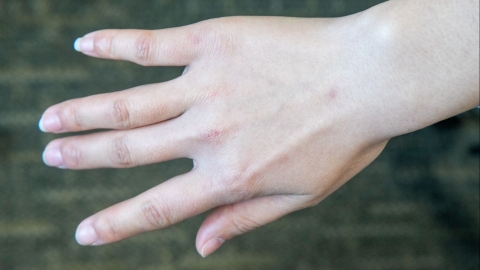What is the cause of hand groping after cerebral infarction?
Brain infarction usually refers to cerebral infarction. Generally, cerebral infarction causing uncontrolled hand grasping may be due to abnormal limb sensations, nervous system dysfunction, cerebral ischemia and hypoxia, post-stroke epilepsy, or brain tissue damage. If discomfort occurs, timely medical attention is recommended. Detailed analysis is as follows:
1. Abnormal Limb Sensation
Cerebral infarction affects sensory conduction pathways, leading to abnormal sensations such as numbness and pain in the hands, which may trigger involuntary scratching movements. Gentle massage and passive movement of the affected limb can help promote blood circulation. Maintaining hand hygiene is also important to avoid skin damage from scratching.
2. Nervous System Dysfunction
Following a cerebral infarction, imbalances in nervous system regulation can lead to decreased control over limb movements, causing involuntary muscle contractions in the hands, manifesting as uncontrolled grabbing. Rehabilitation exercises under a doctor's guidance, such as hand grip training, can gradually restore neural control over limbs. Stabilizing emotions through activities like listening to calming music may also help reduce nervous system excitability.

3. Cerebral Ischemia and Hypoxia
Cerebral infarction leads to localized cerebral ischemia and hypoxia, affecting motor center function and resulting in uncontrolled hand movements, such as grabbing, possibly accompanied by limb weakness. Patients should take medications such as aspirin enteric-coated tablets, clopidogrel bisulfate tablets, and atorvastatin calcium tablets under medical supervision to improve cerebral blood circulation.
4. Post-Stroke Epilepsy
Cerebral infarction can cause abnormal discharges in the brain tissue, leading to epileptic seizures that may manifest as involuntary hand movements like grabbing, often accompanied by brief loss of consciousness. Patients should use medications such as carbamazepine tablets, sodium valproate sustained-release tablets, and phenytoin sodium tablets under medical guidance to control epileptic seizures.
5. Brain Tissue Damage
Cerebral infarction causes substantial damage to brain tissue. When the motor center is affected, the ability to control hand movements diminishes, leading to grabbing behaviors, possibly accompanied by poor hand coordination. Patients should take medications such as sodium citicoline tablets, oxiracetam capsules, and cerebroprotein hydrolysate oral solution under medical supervision to promote brain tissue repair.
In daily life, maintaining a regular routine and avoiding excessive fatigue are important. Assistance with hand care should be provided, and wearing soft gloves can prevent injuries from scratching. Regular follow-up examinations of brain conditions are necessary to monitor disease progression.








